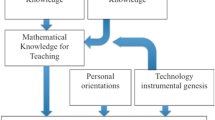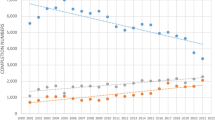Abstract
This study examines gender differences of teachers on their mathematical knowledge for teaching in the context of single-sex classrooms in Saudi Arabia. A translated version of the Mathematical Knowledge for Teaching (MKT) instrument (Learning Mathematics for Teaching [LMT], 2008) in Number and Operation Content Knowledge (CK) and Knowledge of Content and Student (KCS) scales were administered to 197 teachers (146 male and 51 female). Two-sample t test and multiple regression were conducted to compare the two groups and test the effect of teacher background variables. Female teachers significantly scored better than their male counterpart. Gender, years of teaching experience, and specialization significantly predicted teachers’ content knowledge, F(3, 187) = 13.180, explaining 41.8 % of the variance. Only gender and specialization significantly predicted teachers’ knowledge of content and student, F(2, 191) = 6.335, explaining 24.9 % of the variance. Further comparing items in the MKT instrument where female teachers outperformed male teachers confirmed that female teachers were better in attending to the content knowledge in the context of student’s learning.




Similar content being viewed by others
References
Adams, R. (2005). PISA 2003 technical report. Paris, France: Organization for Economic Co-operation and Development.
An, S., Kulm, G. & Wu, Z. (2004). The pedagogical content knowledge of middle school, mathematics teachers in China and the U.S. Journal of Mathematics Teacher Education, 7(2), 145–172.
Anderson-Levitt, K. (2012). Translating as nudging teachers toward “best practice”. ZDM, 44(3), 445–448.
Ball, D. L. (1990). The mathematical understandings that prospective teachers bring to teacher education. The Elementary School Journal, 90(4), 449–466.
Ball, D.L. & Bass, H. (2003). Toward a practice-based theory of mathematical knowledge for teaching. Paper presented at the Annual meeting of the Canadian Mathematics Education Study Group, Edmonton, AB.
Ball, D. L., Lubienski, S. & Mewborn, D. S. (2001). Research on teaching mathematics: The unsolved problem of teachers’ mathematical knowledge. In V. Richardson (Ed.), Handbook of research on teaching (4th ed., pp. 433–456). Washington, DC: American Educational Research.
Ball, D. L., Thames, M. H. & Phelps, G. (2008). Content knowledge for teaching: What makes it special? Journal of Teacher Education, 59(5), 389–407.
Blömeke, S. & Delaney, S. (2012). Assessment of teacher knowledge across countries: A review of the state of research. ZDM, 44(3), 223–247.
Blömeke, S., Suhl, U. & Kaiser, G. (2011). Teacher education effectiveness: Quality and equity of future primary teachers’ mathematics and mathematics pedagogical content knowledge. Journal of Teacher Education, 62(2), 154–171.
Burton, L. (1990). Gender and mathematics: An international perspective. London, England: Cassell.
Cai, J. (2005). U.S. and Chinese teachers’ constructing, knowing, and evaluating representations to teach mathematics. Mathematical Thinking and Learning, 7(2), 135–169.
Carr, M., Jessup, D.L. & Fuller, D. (1999). Gender differences in first-grade mathematics strategy use: Parent and teacher contributions. Journal for Research in Mathematics Education, 30(1), 20–46.
Chudgar, A. & Sankar, V. (2008). The relationship between teacher gender and student achievement: Evidence from five Indian states. Compare, 38(5), 627–642.
Cole, Y. (2012). Assessing elemental validity: The transfer and use of mathematical knowledge for teaching measures in Ghana. ZDM, 44(3), 415–426.
Dee, T. S. (2006). The why chromosome: How a teacher’s gender affects boys and girls. Education Next, 4, 69–75.
Delaney, S. (2012). A validation study of the use of mathematical knowledge for teaching measures in Ireland. ZDM, 44(3), 427–441.
Delaney, S., Ball, D. L., Hill, H. C., Schilling, S. G. & Zopf, D. (2008). “Mathematical knowledge for teaching”: Adapting U.S. measures for use in Ireland. Journal of Mathematics Teacher Education, 11(3), 171–197.
Dodeen, H., Abdelfattah, F., Shumrani, S. & Hilal, M. A. (2012). The effects of teachers’ qualifications, practices, and perceptions on student achievement in TIMSS mathematics: A comparison of two countries. International Journal of Testing, 12(1), 61–77.
Fauskanger, J., Jakobsen, A., Mosvold, R. & Bjuland, R. (2012). Analysis of psychometric properties as part of an iterative adaptation process of MKT items for use in other countries. ZDM, 44(3), 387–399.
Gonzales, P., Williams, T., Jocelyn, L., Roey, S., Kastberg, D. & Brenwald, S. (2008). Highlights from TIMSS 2007. Retrieved from http://nces.ed.gov/pubs2009/2009001.pdf
Greene, B. A., DeBacker, T. K., Ravindran, B. & Krows, A. J. (1999). Goals, values, and beliefs as predictors of achievement and effort in high school mathematics classes. Sex Roles, 40(5-6), 421–458.
Halai, A. (2011). Equality or equity: Gender awareness issues in secondary schools in Pakistan. International Journal of Educational Development, 31(1), 44–49.
Hamdan, A. (2005). Women and Education in Saudi Arabia: Challenges and Achievements. International Education Journal, 6(1), 42–64.
Helbig, M. (2012). Boys do not benefit from male teachers in their reading and mathematics skills: Empirical evidence from 21 European Union and OECD countries. British Journal of Sociology of Education, 33(5), 661–677.
Hill, H. C., Ball, D. L. & Schilling, S. G. (2008). Unpacking “pedagogical content knowledge”. Journal for Research in Mathematics Education, 39(4), 372–400.
Hill, H. C., Rowan, B. & Ball, D. L. (2005). Effects of teachers’ mathematical knowledge for teaching on student achievement. American Education Research Journal, 42(2), 371–406.
Hill, H. C., Sleep, L., Lewis, J. M. & Ball, D. L. (2007). Assessing teachers’ mathematical knowledge: What knowledge matters and what evidence counts. Second Handbook of Research on Mathematics Teaching and Learning, 1, 111–156.
Krieg, J.M. (2005). Student gender and teacher gender: What is the impact on high stakes test scores? Current Issues in Education, 8(9). Retrieved from http://cie.ed.asu.edu/volume8/number9/
Kwon, M., Thames, M. H. & Pang, J. (2012). To change or not to change: Adapting mathematical knowledge for teaching (MKT) measures for use in Korea. ZDM, 44(3), 371–385.
Learning Mathematics for Teaching (2008). Mathematical Knowledge for Teaching (MKT) measures: Mathematics released items 2008. Retrieved from http://sitemaker.umich.edu/lmt/files/LMT_sample_items.pdf
Lindberg, S. M., Hyde, J. S., Petersen, J. L. & Linn, M. C. (2010). New trends in gender and mathematics performance: A meta-analysis. Psychological Bulletin, 136(6), 1123–1135.
Lee, V. E. & Lockheed, M. E. (1990). The effects of single-sex schooling on achievement and attitudes in Nigeria. Comparative Education Review, 34(2), 209–231.
Ma, L. (1999). Knowing and teaching elementary mathematics: Teachers’ understanding of fundamental mathematics in China and the United States. Hillsdale, NJ: Erlbaum.
Mallam, W. A. (1993). Impact of school-type and sex of the teacher on female students’ attitudes toward mathematics in Nigerian secondary schools. Educational Studies in Mathematics, 24(2), 223–229.
Mosvold, R. & Fauskanger, J. (2009). Challenges of translating and adapting the MKT measures for Norway. Paper presented at the American Educational Research Annual Meeting, San Diego, CA.
Mwamwenda, T. S. & Mwamwenda, B. B. (1989). Teacher characteristics and pupils’ academic achievement in Botswana primary education. International Journal of Educational Development, 9(1), 31–42.
Ng, D. (2011). Indonesian primary teachers’ mathematical knowledge for teaching geometry: Implications for educational policy and teacher preparation programs. Asia-Pacific Journal of Teacher Education, 39(2), 151–164.
Ng, D. (2012). Using the MKT measures to reveal Indonesian teachers’ mathematical knowledge: Challenges and potentials. ZDM, 44(3), 401–413.
Schoenfeld, A. H. (2010). How and why do teachers explain things the way they do? In M.K. Stein & L. Kucan (Eds.), Instructional explanations in the disciplines (pp. 83–106). New York, NY: Springer.
Schullo, S.A. & Alperson, B.L. (1998, April). Low SES Algebra 1 students and their teachers: Individual and a bi-directional investigation of their relationship and implicit beliefs of ability with final grades. Paper presented at the Annual Meeting of the American Educational Research Association, San Diego, CA. Retrieved from http://files.eric.ed.gov/fulltext/ED424289.pdf
Seegers, G. & Boekaerts, M. (1996). Gender-related differences in self-referenced cognitions in relation to mathematics. Journal for Research in Mathematics Education, 27, 215–240.
Shulman, L. S. (1986). Those who understand: Knowledge growth in teaching. Educational Researcher, 15(2), 4–14.
Stigler, J. W. & Hiebert, J. (1999). The teaching gap: Best ideas from the world’s teachers for improving education in the classroom. New York, NY: The Free Press.
United Nations Educational, Scientific and Cultural Organization (2000). Increasing the number of women teachers in rural schools: A synthesis of country case studies: South Asia. Bangkok, Thailand: Author.
Warwick, D. P. & Haroona, J. (1994). Teacher gender and student achievement in Pakistan. Comparative Education Review, 38(3), 377–399.
Warwick, D. P. & Jatoi, H. (1994). Teacher gender and student achievement in Pakistan. Comparative Education Review, 38(3), 377–399.
Wiseman, A. W., Sadaawi, A. & Alromi, N. H. (2008, September). Educational indicators and national development in Saudi Arabia. Paper presented at the 3rd IEA International Research Conference, Taipei City, Taiwan.
Zahrani, Y. A. & Jones, K. (2013). Pre-service primary mathematics teachers’ opportunities to learn about school mathematics topics. Research in Mathematics Education, 15(2), 191–192. doi:10.1080/14794802.2013.797751.
Acknowledgments
This research was conducted as part of the research group: (Teaching and Learning of Science and Mathematics in Elementary School) with the support of the Excellence Research Center of Science and Mathematics Education—King Saud University.
Author information
Authors and Affiliations
Corresponding author
Rights and permissions
About this article
Cite this article
Haroun, R.F., Ng, D., Abdelfattah, F.A. et al. Gender Difference in Teachers’ Mathematical Knowledge for Teaching in the Context of Single-Sex Classrooms. Int J of Sci and Math Educ 14 (Suppl 2), 383–396 (2016). https://doi.org/10.1007/s10763-015-9631-8
Received:
Accepted:
Published:
Issue Date:
DOI: https://doi.org/10.1007/s10763-015-9631-8




